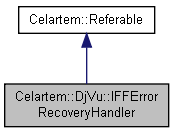#include <djv_chunkdiag.h>
Inheritance diagram for Celartem::DjVu::IFFErrorRecoveryHandler:

Public Types | |
| enum | Action { ThrowException = 0, IgnoreThisChunk = 1, IgnoreThisAndTrailingChunks = 2 } |
Public Member Functions | |
| virtual Action | handleError (Chunk *inParentChunk, const String &inNewChunkId, Storage *inStorage, uint64_t inChunkOffset, size_t inChunkLength, const Exception &inException)=0 |
 Public Member Functions inherited from Celartem::Referable Public Member Functions inherited from Celartem::Referable | |
| Referable () | |
| void | addRef () const |
| void | releaseRef () const |
| size_t | getReferenceCount () const |
Additional Inherited Members | |
 Static Public Member Functions inherited from Celartem::Referable Static Public Member Functions inherited from Celartem::Referable | |
| static void | dumpDbgAllRefCount () |
Detailed Description
This class is used to control error handling during
\ref IFF::deserialize method.\n
By default, \ref IFF::deserialize throws an exception when it
encounters the error on loading a chunk. This class is to recover
from such kind of errors.\n
All you have to do is inherit this class and implement
\ref handleError method. Please note that this class should
initialized with \c new. The following is a sample use of this
class:
class MyErrorRecovery : public IFFErrorRecoveryHandler
{
public:
Chunk* inParentChunk,
const String& inNewChunkId,
Storage* inStorage,
uint64_t inChunkOffset,
size_t inChunkLength,
const Exception& inException)
{
// This method ignores chunks with loading errors.
return IgnoreThisChunk;
}
};
...
AutoPtr<MyErrorRecovery> recvHandler = new MyErrorRecovery();
AutoPtr<Chunk> chunk = IFF::deserialize(
storage, NULL, NULL, NULL, NULL, recvHandler);
Member Enumeration Documentation
Member Function Documentation
|
pure virtual |
This method determines how to treat the error occured during deserialization.
You can also access to the Storage which contains the actual data which causes the loading problem.
- Parameters
-
inParentChunk Pointer to the chunk which has been planed to contain the error chunk. inNewChunkId The Id of the error chunk. If the error was occured on decoding the chunk Id, this may be NullString. inStorage The Storage instance which contains the data of the error chunk. You can call readBytes, setPos, and several information methods on this and the caller is responsible for restoring the original state after your code. inChunkOffset The offset of the chunk on inStorage Storage instance. inChunkLength The size of the chunk on inStorage Storage instance. This may be NULLdepending on the error cause.inException The exception being thrown.
- Returns
- One of Action enumeration values which determines the recovery process.
The documentation for this class was generated from the following file:
